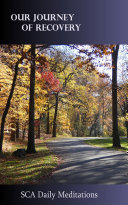The SCA Daily Meditations book
This 396-page book contains a meditation for each day of the year, plus a title index.
The print version of Our Journey of Recovery book will not be sold through the SCA literature store, but only thru Amazon. All other SCA literature is available in our literature store https://sca-recovery.org/WP/literature-and-resources/store/
However, you can buy the E-book version (which includes an interactive topic index and the Slogans) through Amazon, Apple or Google.

